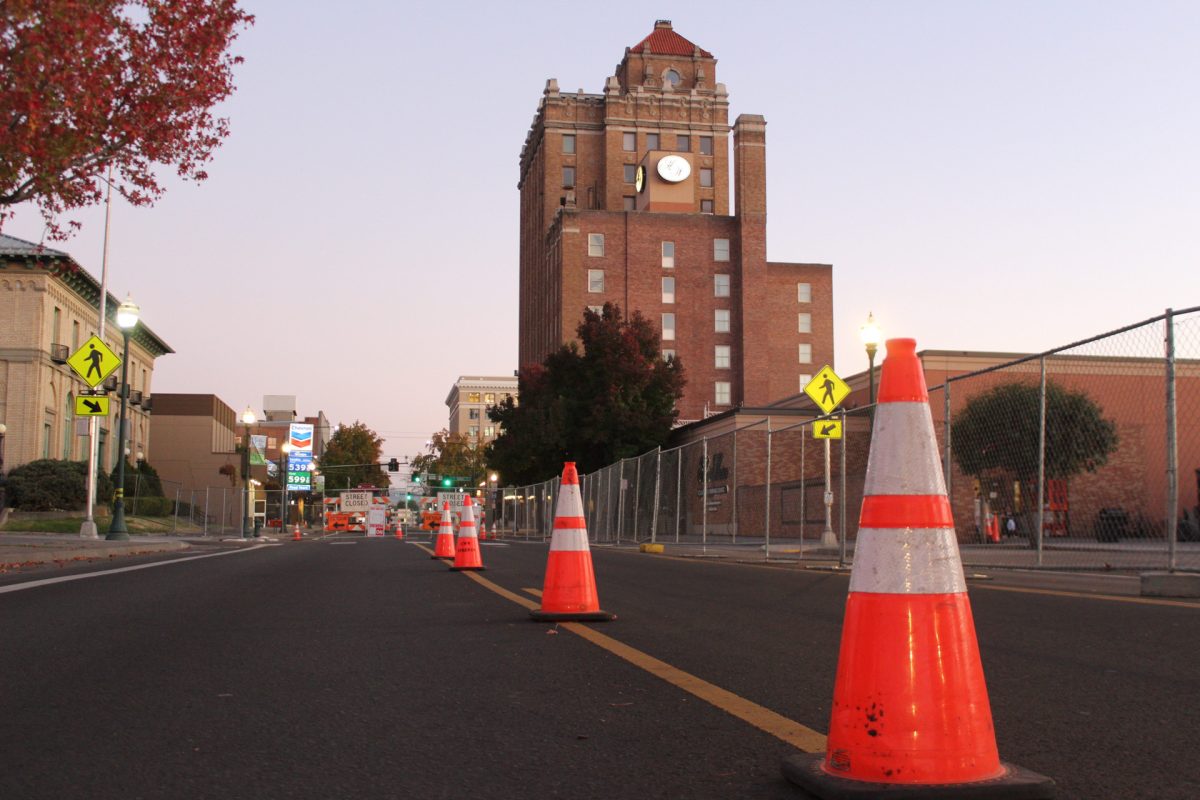
Credit-based music classes Jazz Ensembles I and II have provided students with unique, musical class courses for decades. Professor David Glenn, who came to Whitman in the fall of 1989, helped bring about major changes to the bands and give students better artistic opportunities.
“There was only a six to seven piece group when I arrived,” said Glenn. “The band was [also] more of a combination of students and people in town, and students didn’t really have any ownership of the band.”
Eventually Glenn was able to limit the group to Whitman students only. As interest and enrollment grew, Jazz Ensemble II was added. Jazz Ensemble, the premiere Whitman jazz band, contains 16-20 instrumentalists who perform several times a year. This year, Glenn teaches a Jazz Workshop, a non-performance based class that gives students even more musical and educational options.
Students in the premiere band, Jazz Ensemble, audition every year.
“It’s competitive,” said Glenn. “Everyone, even old members, audition every year. It gives students a chance to defend their spots. Sometimes old members get beaten out [because of] new student talent.”
Students in Jazz Ensemble come from a variety of musical backgrounds. Senior Brian Barton, who came from the Tri-City area, started learning alto saxophone and jazz music in the seventh grade and continued throughout high school. Senior Ross Eustis, who plays trumpet, came from Seattle’s Roosevelt High School, well known for its jazz program.
While talent and a background in music matters, Glenn listed other equally important qualities amongst auditioning students.
“Reliability… and flexibility, and the ability to work in a team frame work, especially in a big band [are important] –– we can’t have any big egos,” said Glenn. “Being able to dedicate time to the band can sometimes put members in when old ones can’t dedicate time anymore.”
While the auditioning process is rigorous, Eustis and Barton value the laid-back atmosphere of musical camaraderie that comes afterwards in the general rehearsal process.
“We’re all there to make music,” said Eustis. “Even with all the different levels, there’s a mutual respect for one another. Ego goes out the door [at rehearsal].”
“We definitely learn from each other… there’s no competition in the room,” said Barton.
Sophomore Jonas Myers, the one of two pianists in the ensemble this year, also emphasized that the peer mentorship in the band allows for more artistic freedom within the group.
“There’s a great musical dynamic within the group,” said Myers. “Dave [Glenn] leads the charge [as a director], but lets the band take direction creatively speaking.”
“There’s a tradition of self-policing within the ensemble,” said Glenn. “This year and last year there has been especially good leadership from the upper classmen.”
Since he plans on retiring this year, Glenn decided to make Jazz II into a workshop-based class than a performance-based one.
“It’s something I’ve always wanted to do,” said Glenn. “I wanted to focus on teaching jazz, rather than preparing for performance. With the Jazz Workshop, students learn to develop skills to improvise.”
Jazz Workshop offers students of varying musical abilities and backgrounds a chance to learn about various jazz techniques and instruments. Some students from the Jazz Workshop gain skills to successfully audition for Jazz Ensemble, and some Ensemble students take the workshop in order to develop new skills.
Because of this new set-up, Glenn was able to supply music to better suit particular musical levels and band techniques and approaches.
“Ensemble gets a lot of brand new music as well as classic pieces… both Ellington Big Band pieces and compositions by [University of Kansas Director of Jazz Studies and Professor of Music] Dan Gailey,” said Glenn. “The ensemble is so big that there has been more and more material the big band hasn’t been able to cover. [In addition] Workshop students get music focusing on Jazz Theory and applying it to improvisational situations.”
While uncertain whether or not these changes will stick, Glenn’s new programs allow for the tradition of jazz, and students passionate about jazz, the chance to flourish and develop within and outside of academia. Eustis and Barton hope that the professor taking Glenn’s place will be able to step up the challenge.
“Hopefully we’ll get some young talent with a lot of energy and enthusiasm, someone good at helping teach improv,” said Barton.
“We have potential here with musicians in the program,” said Eustis. “We’ve got the players –– now we need a director to fill [Glenn’s] shoes and hopefully bring energy to the program.”
The Jazz Workshop’s achievements were celebrated at their fall concert last night, Wednesday November 3. The Fall Concert for Jazz Ensemble occurs tomorrow, Friday November 5 in Chism Music Hall at 7:30 p.m.
















